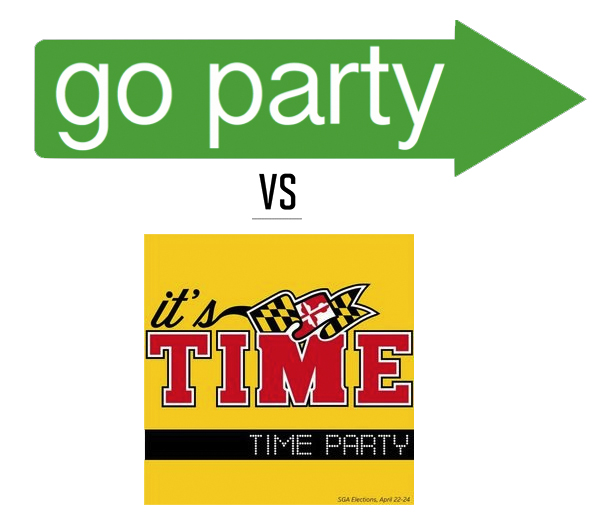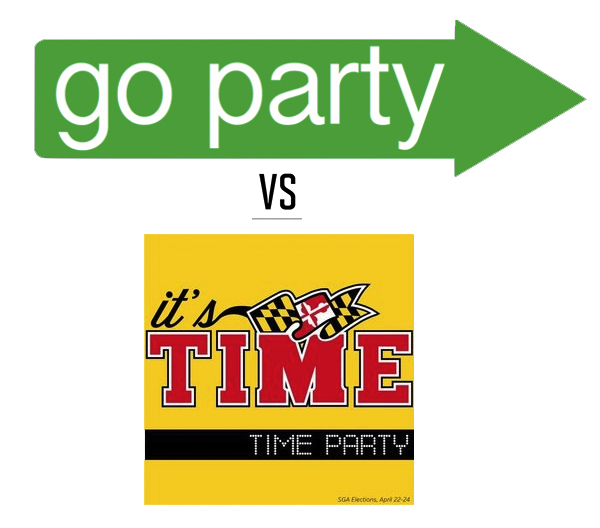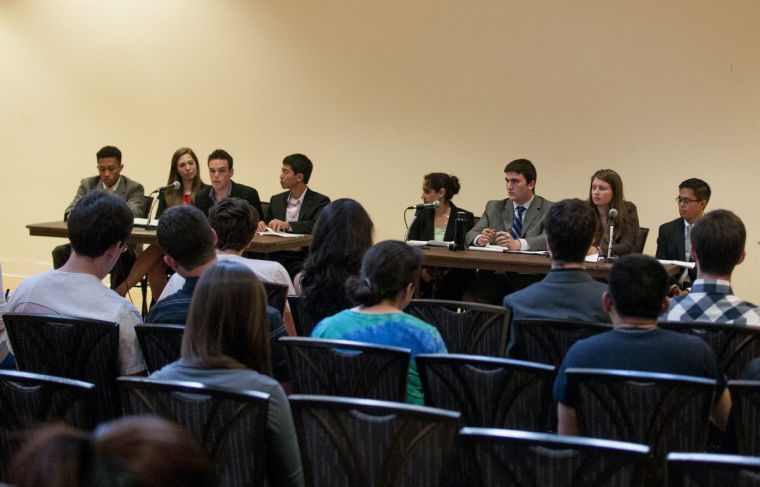In 90 minutes of rapid-fire questions and back-and-forth debate Thursday night, the executive board candidates for the Go and Time parties underpinned the differences in their visions for the campus.
The Student Government Association-sponsored election debate featured the parties’ presidential hopefuls, incumbent Samantha Zwerling and Time Party candidate Noah Robinson, and both party’s student affairs, academic affairs and financial affairs vice presidential candidates. Voting on Testudo is open until Wednesday.
Robinson repeatedly attacked Zwerling for having spent substantial time lobbying in Annapolis rather than focusing attention more singularly on the campus, while Zwerling criticized Robinson’s idea of creating a centralized portal as unwieldy.
“Yes, we want to do things that take a while,” Robinson said. “But we will include students in these initiatives, and it will hugely change the face of the campus.”
“To say that we have not worked on campus is simply not true,” Zwerling said. “Yes, I think it is the best use of my time to keep college affordable.”
The debate spread six rounds of questions across the parties’ platforms and promises — often focusing on specific plans and strategies to achieve those goals.
A member of the SGA elections board asked Zwerling why she had included some initiatives in her platform that she’d previously set out and failed to accomplish, such as TerpsRide.
“I knew last year that I would have the opportunity to run again,” she said, and added that if re-elected she could tackle those goals.
“Many things come up on the way that need to be done immediately,” Zwerling added in regard to the SGA helping launch Get Help UMD, which prompted students to share their stories about using the campus’ mental health resources. “When those things happen, you don’t stick to the plan.”
Robinson took a rebuttal, saying, “Reacting is not the real role of an SGA president, it is about being proactive.”
The debate directed another question toward Robinson’s role as an undergraduate senator, asking why he did not submit any of his platform initiatives to the body this year.
“I did not have the time,” Robinson said. “What is great is that I will be dropping everything to be the SGA president and to focus on the student body.”
In her rebuttal, Zwerling criticized Robinson for having taken on a leadership role by joining the senate without committing enough time to have an impact.
“It is shocking to me,” she said.
Both parties, however, found areas to partially agree on. The candidates for financial affairs vice president, the Go Party’s Andrew Aggabao and the Time Party’s Cameron Ross, said it was not time to increase the student activities fee.
“Only 200 of 700 student groups apply for the money,” said Ross, who served on the SGA’s finance committee this year. “There are large amounts of funding left.”
Aggabao added that the organization needs more time to test its rolling-basis funding allocation system, implemented this semester.
“We need more data,” Aggabao said.
However, the two parties had differing views on the exploration of online and blended learning classes.
Meenu Singh, the Go Party’s candidate for academic affairs vice president, said, “Technology is not coming, it is right here,” emphasizing the need to adapt to these changes, and fast. Meanwhile, theTime Party’s candidate, Stephanie Graf, replied, emphasizing a “need to use technology, but in the right way.”
Graf and Singh clashed again on the issue of open-source textbooks, one of the main topics on the Go Party’s agenda.
“It is a great idea, but not the only option,” Graf said, adding that it would not be feasible to get faculty to write these books and make them accessible for their students soon.
However, Singh said they are the key to textbook affordability. They must be peer reviewed to ensure they live up to the standards of traditional textbooks, she added.
The student affairs vice president candidates, Josh Ratner for the Go Party and Jonathan Lee for the Time Party, had the chance to express their different ideas on commuters’ struggle to arrive at exams on time during finals week.
While Ratner’s plan calls for the university to provide on-campus housing to students during that time, Lee said that could overburden dorms already squeezed for space.
Instead, Lee said, the SGA should tackle the problem of traffic by rerouting shuttles and making it easier to travel to the campus, which could help students get to early classes and exams.
When the debate turned toward the parties’ sustainability efforts, Lee and Ratner both mentioned the need to work on students’ use of bikes. But while Ratner emphasized the importance of bringing the Capital Bikeshare program to the campus, Lee said his first priority would be working with Facilities Management on the campus’s lack of bike lanes.
At the end of the debate, the Elections Board allowed a few questions from the audience.
Mike Lichtenberg, chairman of the SGA’s constitution and bylaws committee, asked whether each party was open to integrating members of the opposing party into their cabinet if elected.
“If they are the most qualified for the job, then yes,” Zwerling said. Robinson added that he especially offered Zwerling a position in his cabinet to give her the opportunity to lobby in Annapolis while the SGA president could keep the focus on the campus.
newsumdbk@gmail.com
The incumbent Go Party, led by SGA President Samantha Zwerling, is challenged this year by Time Party, led by Noah Robinson.
SGA candidates debate in the Stamp Student Union atrium on Thursday.





